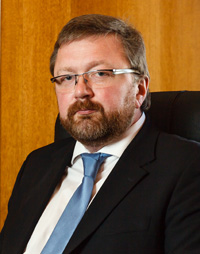
Oleg Barabanov, Director for Development and Restructuring, Rosatom State Corporation
PRODUCTION LOCALIZATION AND TRANSFER OF FOREIGN TECHNOLOGIES
Nowadays, introducing state-of-the-art technologies plays a significant part in the process of developing modern Russian production. Rosatom organizations are continuously working to improve existing products and start manufacturing new ones. In some areas, it involves foreign technologies.
In 2016, we agreed on a localization program for NPP construction programs abroad with Schneider Electric, as we have common business aims. We’ve been successfully deepening our cooperation since 2013, and the key area of our interactions is transferring Schneider Electric production technologies for NPP-related equipment that are in compliance with international and Russian safety requirements, as well as the task of modernizing the nuclear industry in Russia, to State Corporation FSUE Ural ElectroMechanical Plant (FSUE UEMP).
There is an important prerequisite of cooperation that the produced equipment is to be strongly localized: in addition to assembling the equipment, we are to manufacture parts and components for the final product. Stronger localization of products manufactured at Russian plants under foreign licenses or at joint establishments with foreign parties provides for more cost-effective parts, new jobs, and, last but not least, adopting the foreign production technology at our own plants.
By means of production localization and technology transfer, foreign manufacturers import design documentation, technologies, professional expertise, special knowledge and competences, rather than just actual components. Any plant involved in localization will establish a development and modernization plan aimed at reaching the level that would meet the foreign partner’s requirements and introducing certification of manufacturing according to the Western standards, which implies technological, organizational and administrative changes.
So, by doing so, we are gradually shaping world-class manufacturing culture and creating capacities of advanced level without having to bear the costs of redeveloping the technologies that already exist.
Cooperating with foreign partners will help us master after-market services of complex products, which is to increase competitiveness and margin of our business, or even lead to transforming traditional business models in some cases.
Looking ahead, we expect to make another step – take part in upgrades of the localized products and developing new products on this basis in cooperation with our foreign partners. It shall make cooperation more advantageous for the both parties, so they’d be motivated to continue the trend.

